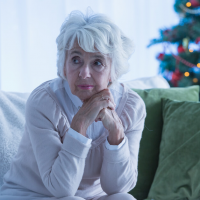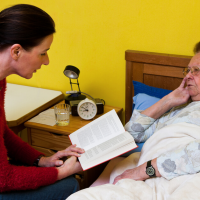Mindfulness Meditation & Grief: Managing Compulsive Rumination

Losing a loved one can leave you with an open void in your being — a hole that you try to fill with memories as well as thoughts of what could have been. Clinging to memories, agonizing over their passing, and pondering a world where they’re still with you — all of these mental activities can make it enormously challenging to return to any semblance of a normal life. Some, however, are working to manage their grief by training their minds to focus on the present rather than remain tangled in the past or future. Such a practice is popularly known as Mindfulness Meditation.
Isn’t meditation for people who eat tofu and smell like patchouli?
If you’re like most people, initial thoughts of meditation include hippies in tie-dye sitting cross-legged with their fingers pinched towards the sky. Unfortunately, this has been the reputation meditation has suffered from for over a generation. As ABC’s News correspondent and meditation advocate Dan Harris once put it, “Meditation has been the victim of the worst marketing campaign ever.” However, a growing body of scientific research is busting the misconception that meditation is solely for vegetarians who burn sage to ward off negative energy. The benefits of the secular practice of Mindfulness Meditation include everything from stress reduction, managing anxiety, depression, and one’s attention span. No hocus pocus required.
How does Mindfulness Meditation work?
The “mindfulness” aspect of Mindfulness Meditation is built on the idea that we can train our minds to better identify moments of rumination, perceive them without judgment, and let them go like clouds in the sky.
Neuroplasticity: the ability to reshape your mind.
For generations, scientists were under the impression that, once our brains were fully developed, the ability to grow new neural pathways ceases. Studies by researchers in the 20th century, however, provided evidence of neuroplasticity — the ability for our brains to establish new pathways and even change shape. These new studies only confirmed old truths understood by long-time practitioners of Mindfulness Meditation — many who had been retraining their minds towards positive focus for generations.
What does Mindfulness Meditation look like from the meditator’s perspective?
A regular daily Mindfulness Meditation session usually proceeds like so: A person sits comfortably either on a cushion on the floor or in a straight-back chair. They keep their spine straight, head level, and eyes closed. They then bring their full attention to the raw sensation of their breath — either on their nostrils, chest, or belly. While attempting to bring their full attention to their breath, random thoughts inevitably start — what the Buddhists call "the Monkey Mind." These thoughts may vary from what to eat for lunch to regret over a joke that bombed in yesterday's meeting. The goal of Mindfulness Meditation is simply to notice that one is, in fact, thinking. Once a thought is detected, the practitioner returns their focus back to their breath. Many practitioners will even make a mental note once they realize they are thinking, allow themselves to observe the thought without analyzing its contents, and then return their attention back to the present moment by focusing on their breath. These seated Mindfulness Meditation sessions can last anywhere from 10-30 minutes a day. Some practitioners prefer guided meditations in the form of audio recordings or through classes at a meditation center. Others prefer to meditate alone and unguided.
How does Mindfulness Meditation help with grief, anxiety, and depression?
Mindfulness Meditation heightens a mental skill known as “meta-awareness” — the ability to recognize when you are lost in thought. Meta-awareness also allows a person to realize that they are separate from the voice in their head that we all experience. Continued sessions of Mindfulness Meditation helps one resist being dragged around by their thoughts, ruminations, and emotions. Each instance of noticing that you are lost in thought is a “bicep curl for the brain,” according to Dan Harris. Continued practice develops the skill to more quickly notice "monkey mind" ruminations and to return focus on the present moment. Several scientific studies have shown that mindfuless helps develop emotional regulation of the brain.
Though depression and anxiety are also the possible product of chemical imbalance, they can also be the product of uncontrollable rumination. Mindfulness Meditation has been shown in various studies to reduce the symptoms of depression and anxiety. In one study, Mindfulness Meditation was shown to be equally effective as medication in reducing the likelihood of depressive relapse for participants.
“But I’m not trying to forget my loved one.”
One possible objection to Mindfulness Meditation for the treatment of the symptoms of grief is the idea that meditators are attempting to trick their brains into being happy. While greater emotional control is a benefit of Mindfulness Meditation, the primary benefit of the practice is the reduction of compulsive rumination and a renewed focus on the present. Even when the present moment is challenging, regular meditation sessions can help alleviate the emotional suppression that can hold someone back from processing grief. Suppressing emotions can greatly extend symptoms of depression and anxiety associated with grief. Mindfulness Meditation can help sufferers start to gain a footing on their own emotional journey towards healing.
How to Begin a Mindfulness Meditation Practice
To see if Mindfulness Meditation is beneficial to you, various guided meditation apps, books, and classes exist to help. Some of the most popular guided meditation services are Calm, the Ten Percent Happier App, Headspace, and Waking Up. Courses in Mindfulness Meditation also likely exist in your area either through independent centers or wellness institutions.
The friendly specialists at CURA-HPC believe that hospice and palliative care goes beyond the patient — also extending to caregivers and loved ones. You’re invited to learn more about CURA-HPC Hospice and Palliative Services today.



